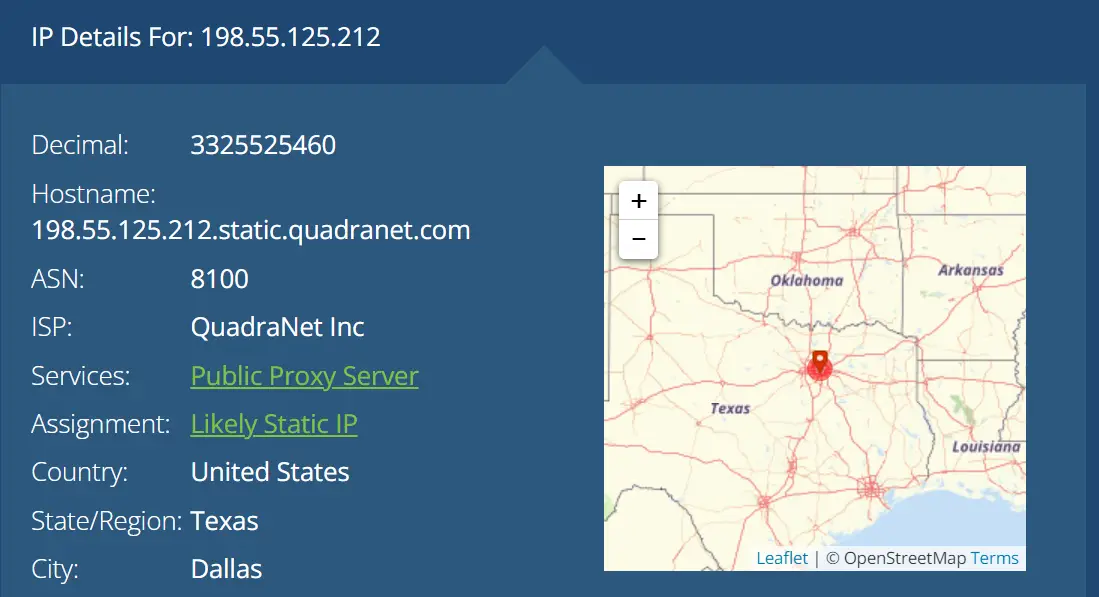Let's chat about network connections
You might remember from the prerequisites, that I was adamant that you only set up a Lightning node if you had a very stable and reliable internet connection. I want here to add a bit more background to this to help you understand your options.
The problem of IP Addresses
You might know that, when you use the internet, any website you visit can see the IP address from which you visit.
The IP address they see doesn't (usually) identify your individual computer, but does identify your sub-network.
The kind of information that can be gleaned from the IP varies on your type of sub-network.
Let's choose a random IP address, say, 198.55.125.212, and see what we can find out about this:

This is typical for a home internet connection: We can see this user is in Dallas, Texas. A home IP can allow usually someone to locate you in a particular city, but not necessarily with more detail than that.
However, there are lots of exceptions, and, especially with a static IP like is used in many commercial environments, given only your IP, a viewer might be able to narrow down your location to an actual street or building.
Clearly, this is not great for the Lighting network, because as we saw in How private is Lightning?, the Lightning network is designed to be used in places where companies and governments are actively trying to restrict financial freedom, and might actually prosecute individuals who are attempting to use the network.
I don't get it, what is the problem in revealing my IP Address again?
Let's talk about license plates.

A license plate allows for surveillance
If you have a car, your government requires you to get a license plate. This is for a good reason: You are operating a big, heavy, dangerous machine.
If you hit someone with your car, it's reasonable for that person to have a guaranteed way to personally identify you.
The requirement for license plates allows for widespread surveillance of anyone driving a car, but society has accepted this surveillance as a necessary trade-off: public safety is balanced with individual rights, and in this case, we care more about public safety.
Using the internet is not a public safety risk
But when you are "traveling" the internet with your web browser, the risk dynamics are completely different: You have zero chance of causing damage to anyone else. Nobody needs to be "protected" against your internet usage.
The fact that you can be identified by an IP Address when using the internet is just a technical accident. The designers of the Internet certainly did not plan for a world where Internet users would be constantly identified in this manner.
Internet surveillance has very real human rights cost
The Lightning Network is designed was an audacious goal: To enable financial freedom for the billions of people who live in non-free societies. In order to use Lightning, it is critical that these people are able to use the network anonymously.
If a Lightning user in China, Russia, or North Korea uses lightning and their IP address is exposed, they could go to jail.
This is why Lightning nodes are designed with "privacy by default".
TOR: The default way to use Lightning
Short for "The Onion Router", TOR is a way for your computer to connect to the internet WITHOUT revealing its IP address to anyone.
TOR is the default way that your node connects to other Lightning nodes, and if you are using Rizful, or a pre-built node like Umbrel, you'll automatically use TOR.
You don't need to understand the details of how TOR works, but there are few things you need to keep in mind.
TOR can be slow
Instead of routing data over the whole internet, a TOR connection only talks to other TOR nodes, and sometimes that can be slow.
Will that be a problem for you? To find out, we need to remember the purpose of your node. Be sure you've chosen a purpose on this previous page: What is the purpose of your node?.
If your purpose is "Mostly Send"
TOR will work perfectly for you.
If your purpose if "Mostly Receive"
TOR should generally work well, but incoming payments might sometimes take a few seconds to confirm, and occasionally you might find that your node is unreachable and offline. If you're not paranoid about privacy, you should consider setting up a Clearnet IP.
If your purpose if "Routing Node"
This is where TOR is a problem. Back in the early days of the Lightning network (way back in 2019 and 2020), many enthusiasts thought that they could run routing nodes with only TOR connections.
It's taken a few years, but a new consensus is now emerging that if you are serious about running a routing node, in addition to TOR, you also need a "clearnet" address: This, basically, is a public IP address that everyone can see.
If you want to run a routing node, we're going to be covering a safe way to set up a "clearnet" address, which will still protect your location data. It takes some work, and we'll it discuss it in the A Clearnet IP For Your Node.